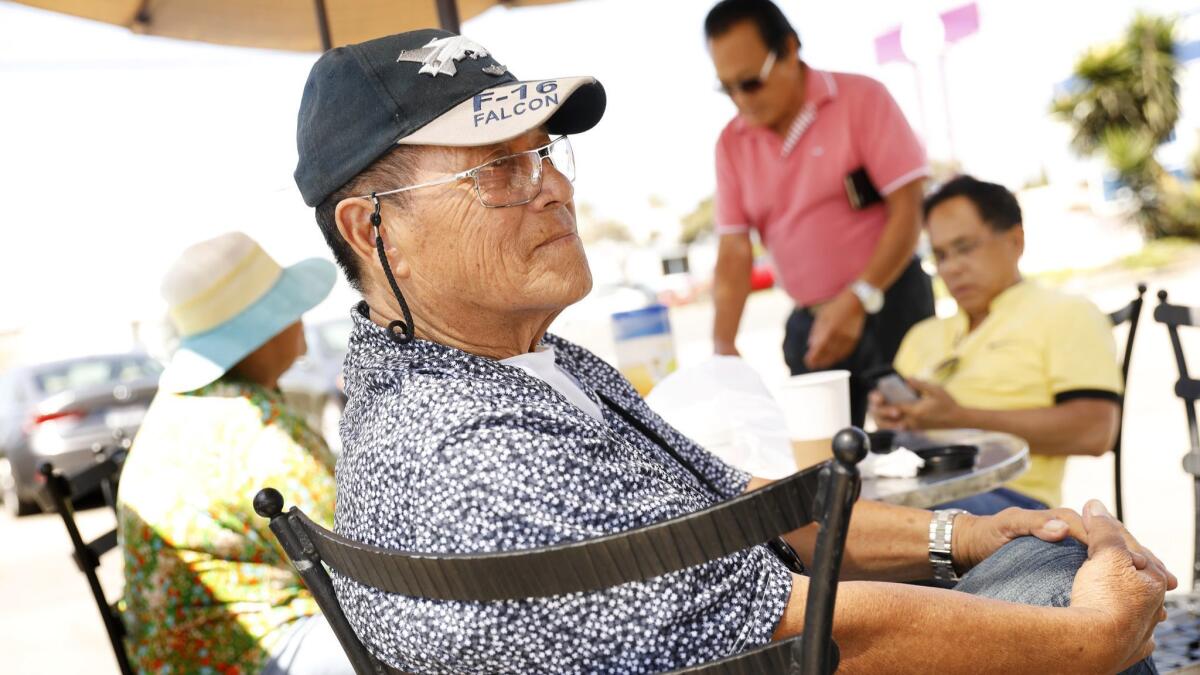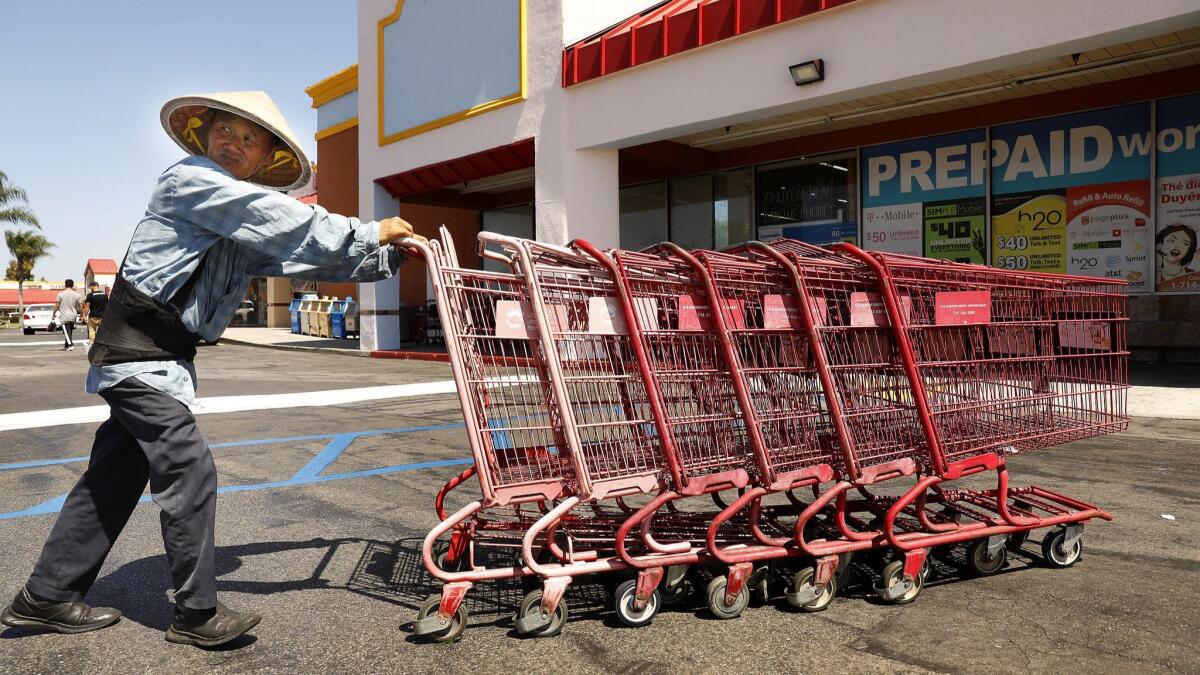Must Reads: In Little Saigon, strong support for Trump’s war on illegal immigration collides with other realities

Sipping iced coffee with his wife at Tip Top Sandwiches in Little Saigon, Anh Quy reminisced about his early days in the United States.
After American troops pulled out of South Vietnam in 1975, the U.S. government let refugees into the country and helped them establish lives in places such as Orange County.
Quy felt welcome in his new home, but it’s a charity the 81-year-old wouldn’t extend to immigrants who come to the U.S. illegally.
“There’s crisis now because in California, we are so close to the border that when there’s so much travel … without control, it becomes chaos,” the former singer and marketing director said. “Illegal is not acceptable. It affects our safety.”
President Trump’s crackdown on illegal immigration has sparked strong criticism and protests across California. But among older residents of Little Saigon, he has found a corner of support for his hard-line tactics and rhetoric.
They too believe that those who want to come the United States should go through legal channels, just as they did.
“There are Vietnamese who perceive that people from Mexico didn’t sacrifice as much coming here. They think Mexico and the U.S. are so connected. You can’t go to Vietnam for the weekend. But from here, you can go to Mexico,” said Fred Smoller, an associate professor of political science at Chapman University.
Those attitudes could help Rep. Dana Rohrabacher (R-Costa Mesa), a hard-liner on illegal immigration, in his bid for reelection in the 48th Congressional District, which includes Little Saigon. His seat is one of several in California traditionally held by the GOP that are tightly contested and could help determine control of the House.
Rohrabacher is campaigning largely on his support of Trump’s border wall and opposition to any kind of amnesty. His opponent, real estate investor Harley Rouda, says he wants a secure border and a path to citizenship for law-abiding immigrants who are in the country illegally. Republicans are trying to paint Rouda as a radical.
Support for Trump’s crackdown is far from universal in Orange County’s Vietnamese community. Younger generations, which tend to be more liberal than their parents and grandparents, have concerns about Trump.
They note the day-to-day reality that the economic engine of neighborhoods such as Little Saigon is often greased with the cheap labor of immigrants from Mexico and Central America, many of whom are in the country illegally.
“Honestly, Little Saigon or any of these ethnic communities may not survive” without Latino labor, said Catherine Dao, a 22-year-old receptionist from Fountain Valley. “Look at who’s cooking in the kitchen or sweeping the restaurant floors. The older generation may be stubborn or unaccepting, but I don’t think that way.”
It’s all part of a larger divide playing out in the community.
The first wave of Vietnamese immigrants “came out in force as anti-communists, and they strongly believe that the Republican Party is more understanding of their stance,” Smoller said. “It’s this party that they have pledged loyalty to because they can never forget the loss of their country — even if their younger generation is more concerned with domestic issues.”
Nearly 145,000 Vietnamese and more than 344,000 Latinos live in Westminster, Garden Grove and Santa Ana — the three cities spanned by Little Saigon, according to the 2010-14 American Community Survey, an ongoing statistical study by the U.S. Census Bureau.
“Ultimately, politicians need Latino votes,” Smoller said. “I’m sure they go to meet-and-greets with many people who are Latinos and they are uncomfortable with offending them.”
Tony Lam, 82, the first Vietnamese American elected to political office in 1992 when he won a seat on the Westminster City Council, said he did not know enough about issues of illegal immigration to comment. He simply said that a strong U.S. immigration policy should include an element of “boosting the economy while helping small business. Then it becomes a win-win for both sides.”
After the fall of Saigon in 1975, tens of thousands of “boat people” escaped their homeland each month, dying on the dangerous seas or landing on foreign shores. Initiatives in later years that allowed Vietnamese to gain entry into the U.S. included the Orderly Departure Program. Created in 1979 under the auspices of the United Nations High Commissioner for Refugees, the program enabled more than 620,000 Vietnamese to safely resettle abroad — with nearly 460,000 of them sent to the U.S., according to the Southeast Asian Archives at UC Irvine.
Given their experiences during the war and fleeing their homeland, Kim Van said, she understands where her parents and grandparents are coming from. But she doesn’t always align with them.
The older generations, the 18-year-old Garden Grove musician said, “are hardcore — everything has to be, ‘We are for this or against this.’ There’s no gray area.
“We are more liberal,” she said. “We want to listen to a person and learn about his struggles before we decide what type of politics we can support.”

Le Huynh, the son of a South Vietnamese army veteran, feels differently.
His father, mother and younger sister immigrated thanks to the State Department’s Humanitarian Operation program, which was unveiled with the cooperation of Hanoi. Beginning in 1990, it brought high-ranking South Vietnamese officers and government officials imprisoned in communist reeducation camps to the U.S. Almost 100,000 people, the last stragglers of the war and their family members, were estimated to have arrived under this program.
At 56, Huynh can count years of struggling to make a living, including a job ironing shirts and pants for 5 cents apiece. His health has prevented him from getting white-collar employment, he says. Instead, he toils six days a week for $11 an hour tending shopping carts for a Vietnamese supermarket teeming with traffic in Garden Grove.
“I’m competing for the same work as the Latinos,” he said. “The difference is I’m here legally.”
Quang Nguyen can tick off a few things, from Trump’s stances on healthcare and North Korea to his bombastic style, that he finds disagreeable about the president.
But when it comes to illegal immigration, the human resource specialist said, he was all in with the commander in chief.
“I agree with him about people getting permission to be admitted to the U.S.,” the 67-year-old said, leaning into his office chair in Little Saigon, surrounded by paperwork and a carton of ramen. “If we as refugees came here legally, others need to go the same route.”
Chi Quang, 57, said she had to wait 12 years to enter the U.S. after siblings in Orange County filed for family reunification — the program that allows American citizens and green-card residents to sponsor their relatives. She said she was told the process stretched so long due to an overwhelming number of applications.
“Who wouldn’t want to go to America?” she said at iLanet Coffee in Garden Grove. “I don’t support them coming without papers, but I can see why they take risks to have a stable life.”
Times staff writer Joe Mozingo contributed to this report.
Twitter: @newsterrier
More to Read
Sign up for Essential California
The most important California stories and recommendations in your inbox every morning.
You may occasionally receive promotional content from the Los Angeles Times.











